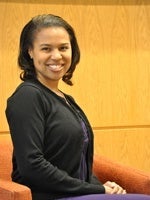January 4, 2012 — It’s one thing to understand the public health implications of scientific evidence.
It’s quite another to use that information to successfully implement real public health improvements.
The challenge of leaping from theory to practice has prompted the creation of new programming, offered through the Harvard School of Public Health’s Center for Public Health Leadership, that will form the backbone of an interdisciplinary leadership concentration. The new program will be fully introduced in fall 2012.
The new offerings include a seminar in which students can assess their leadership styles; an advanced leadership seminar series featuring experts who study leadership as a discipline; a new course on leadership in teams; and a day-long workshop with the intriguing title “The Secret Lives of Groups,” which gives participants outside-the-box opportunities to learn about group dynamics.
Also new this fall are opportunities for students to help administer “FastTrack” programs in public health settings. FastTrack is a rapid-cycle method of organizational improvement typically used in businesses.
“There are three main approaches to teaching leadership,” said John McDonough, director of the Center for Public Health Leadership and professor of the practice of public health at HSPH. “One way is to teach theory. Another way is to expose students to leaders. And the third way is to help students figure out their inner journey, to ask them, ‘What is it in you that strengthens you and gives you the capacity to be a leader? And what holds you back?’”
The new programming is aimed squarely at the “inner journey.” The goal, said McDonough, is to create “a robust avenue for students who want to take that journey.”
Students give the new programming a big thumbs-up.
Unconventional Workshop
HSPH student Shaniece Criss, who’s working toward a doctor of science in society, human development, and health, said participating in the group dynamics workshop gave her a chance to try some novel activities. The unconventional workshop, held in mid-October, brought together 30 HSPH students and 30 Harvard Kennedy School students for a full day—with literally no agenda.
Consultants encouraged the participants to focus on things such as who took leadership roles in the groups and why; which voices got listened to and which didn’t; and what propels the work of groups, and what slows it down.
Participants were also encouraged to evaluate their own leadership styles.
Even with no agenda, Criss said, some participants emerged as leaders while others hung back. The consultant helping to run her group gave minimal direction but would sometimes interject a comment, such as “Notice who’s taking the lead” or “Why are some people in the group being listened to more than others?”
The day often felt uncomfortable, Criss acknowledged. But she said the group prompted her to think about things she wouldn’t normally think about—like why she may or may not have felt the need to speak at a particular time, or why certain people were not speaking.
Another group workshop participant, HSPH student Angela Crane, said she learned she doesn’t always have to be the extrovert in a group to be an effective leader. “It made me realize it’s the quality of what you say that’s important, not the quantity,” said Crane, who’s working toward a master’s degree in public health in society, human development, and health.
Teamwork Required
Caitlin Taylor Reiche, a master’s student in health policy and management at HSPH, is involved with FastTrack projects at both the Dana-Farber Cancer Institute and Mass General Hospital in Boston. Both projects require people from different departments within each organization to agree on strategies to change certain systems or procedures—within just 90 days.
For the Dana-Farber project, Reiche is working on ways to reduce the current four- to six-month wait for treatment at Dana-Farber for African American patients from a local health center with suspected malignancies. At Mass General, she is working to improve assessment and treatment for hepatitis C patients at the hospital’s Charlestown, Mass. clinic.
Reiche, who worked for a large management consulting firm last summer, said, “I thought management consultants did things quickly. But this is really quick.” Thanks to the hands-on experience with FastTrack, Reiche is confident she can incorporate elements of the strategy in her future work.
In the new course on leadership in teams, students learn ways to work effectively in teams, set agendas, and resolve disputes. Then, focusing on a particular public health issue, they meet with actual community representatives—say, from the Boston Public Health Commission or from the city’s public schools or from parent groups—to learn about different perspectives on the problem. Then the students regroup, representing the viewpoints of their respective stakeholders, and try to fashion a solution. The class is taught by a team that includes McDonough; Roderick King, public health leadership fellow at HSPH and instructor in social medicine at Harvard Medical School; William Bean, HSPH instructor; and Michael McCormack, director of practice in the HSPH Office for Educational Programs.
Nancy Turnbull, senior lecturer on health policy and associate dean for educational programs, said the class, the workshop, the self-assessment seminar, the leadership seminar—all are crucial to advance the cause of public health.
“HSPH’s educational mission is to train leaders who can help make the world healthier,” she said. “Training in the science and skills of leadership is an essential part of that education.”
–Karen Feldscher
photo: Aubrey LaMedica
